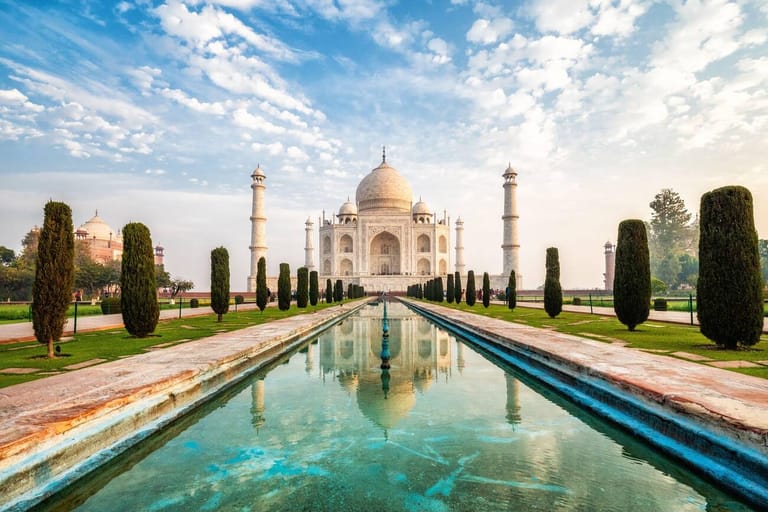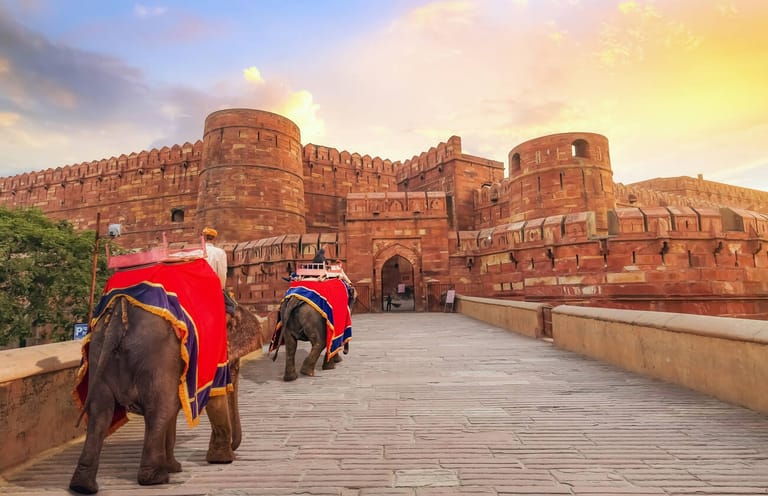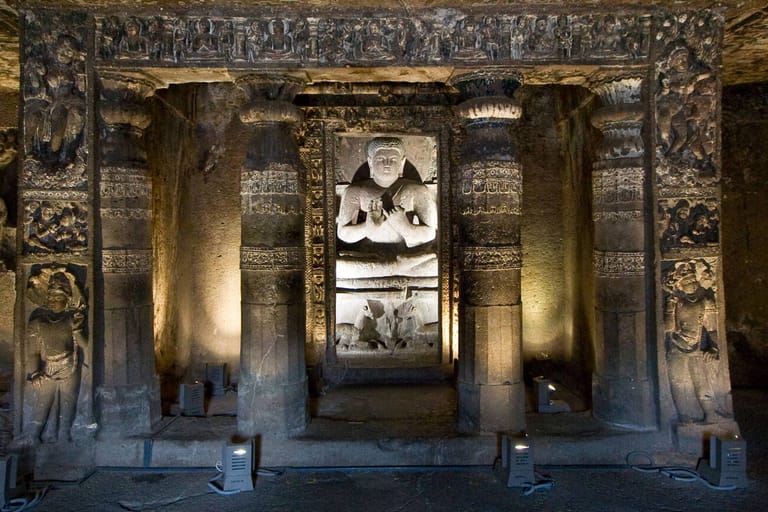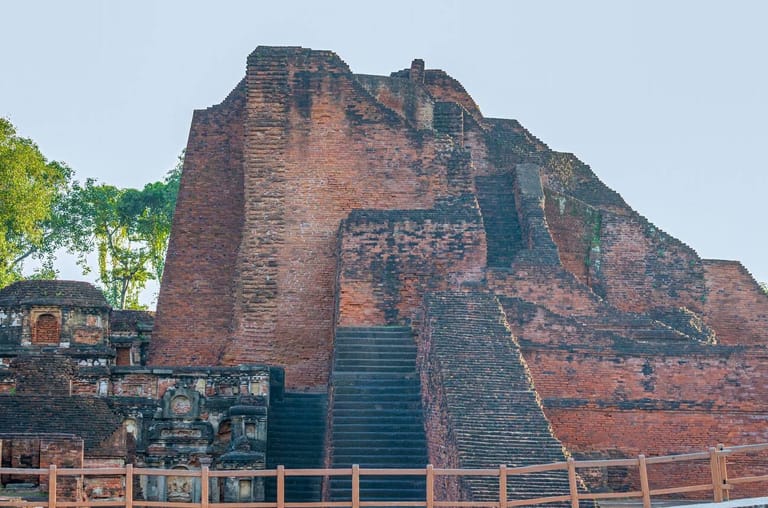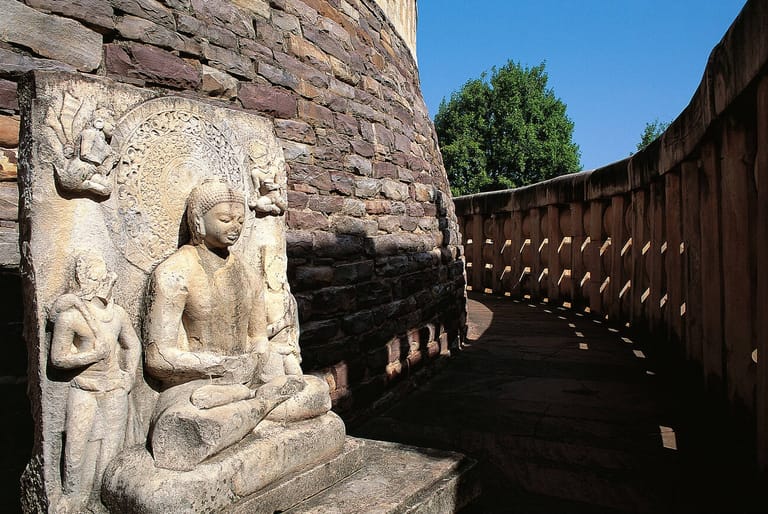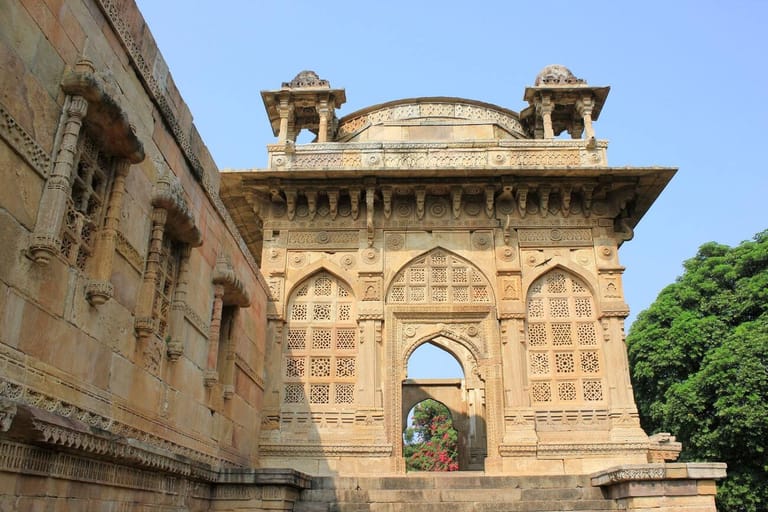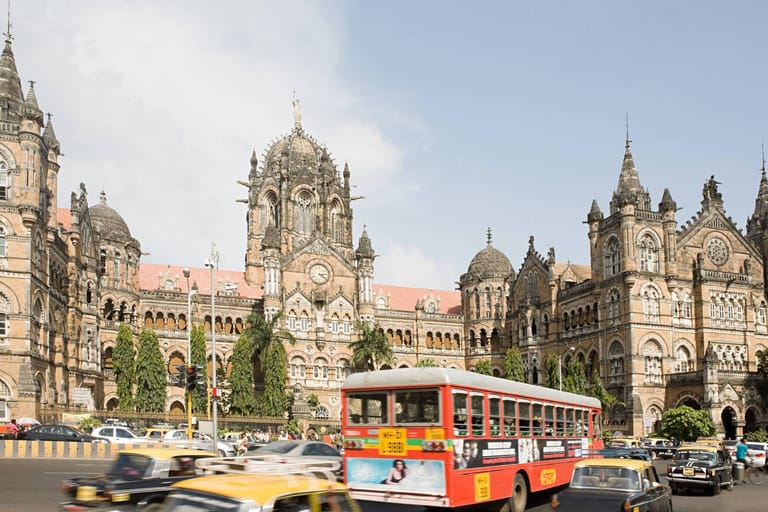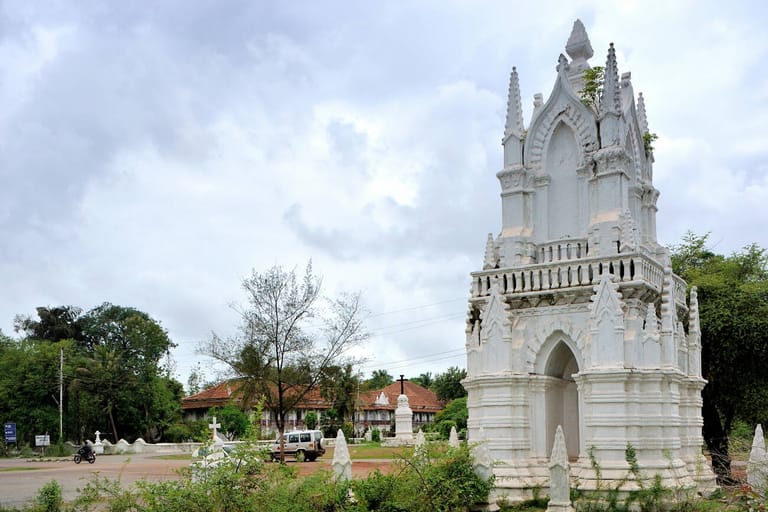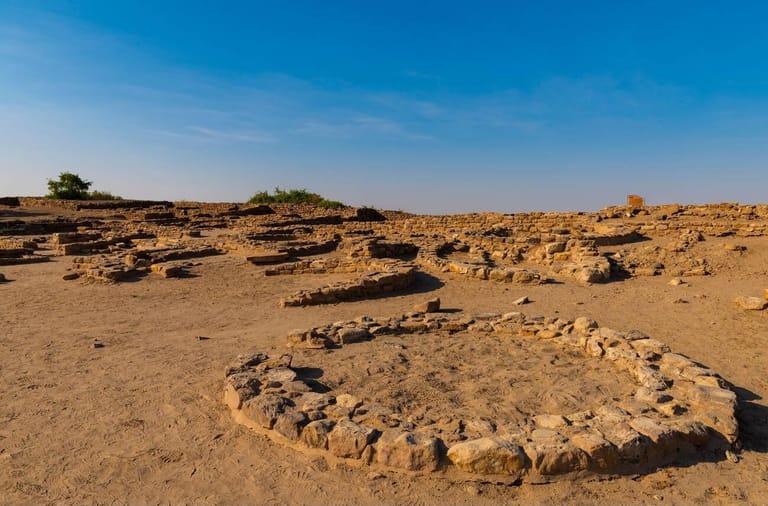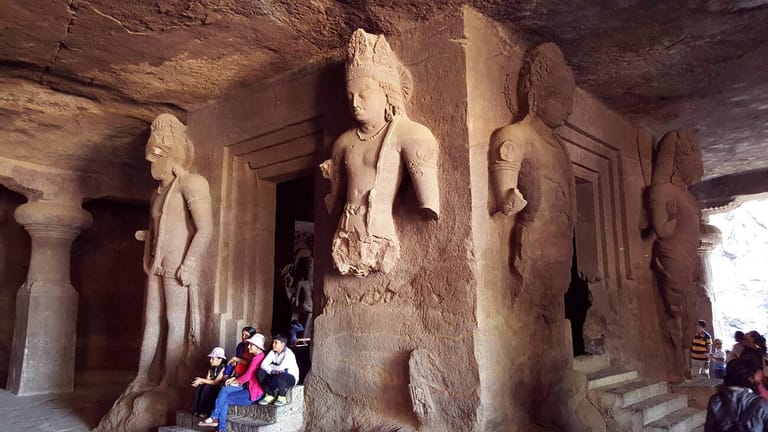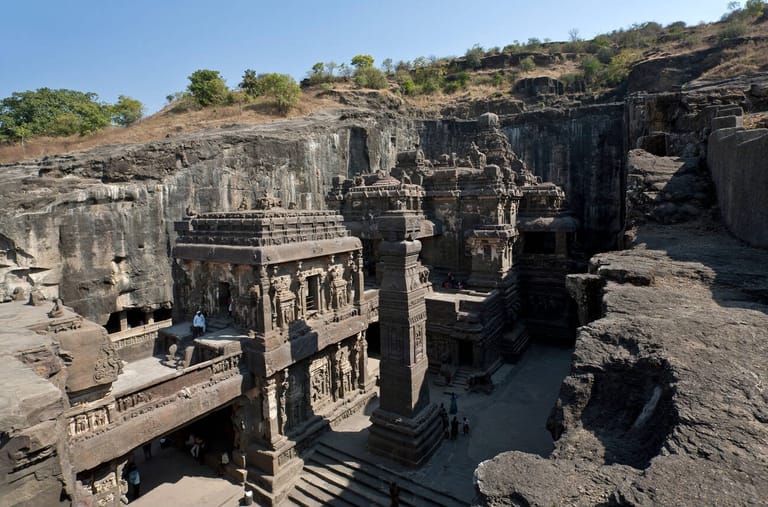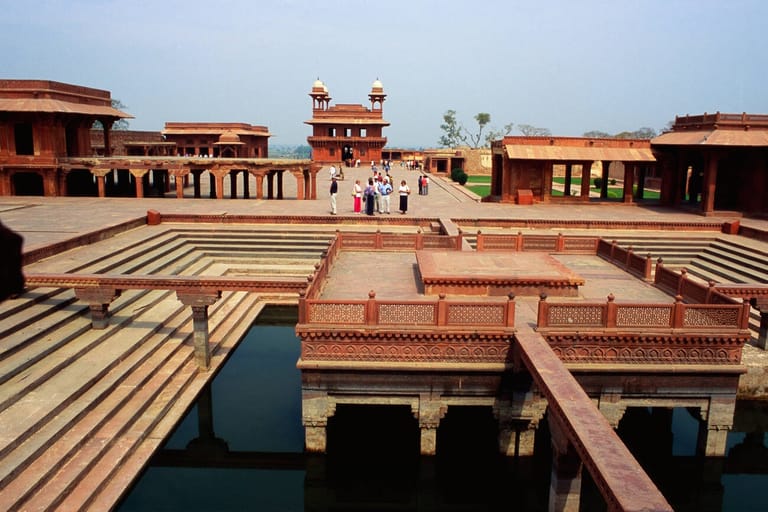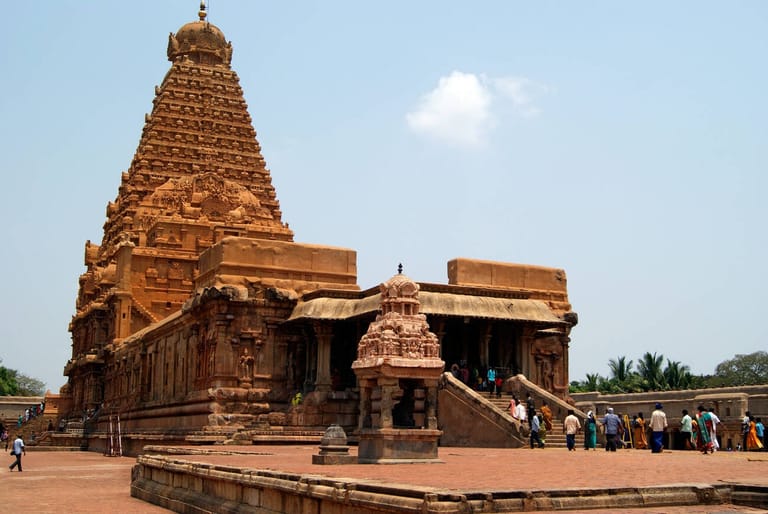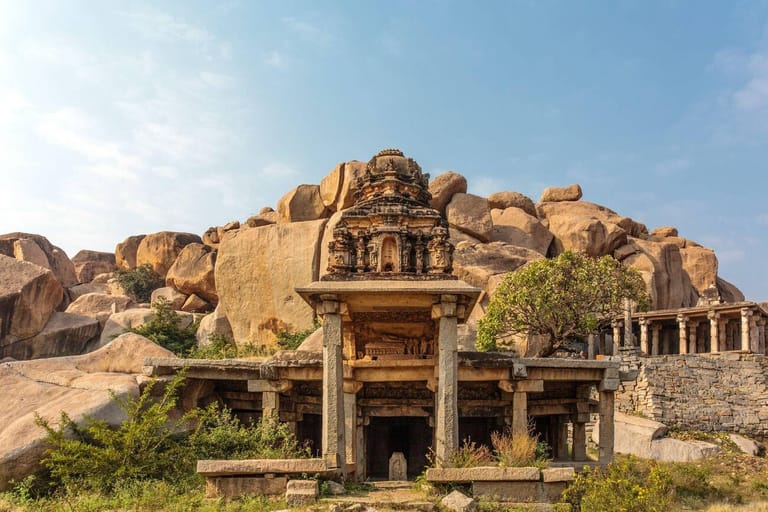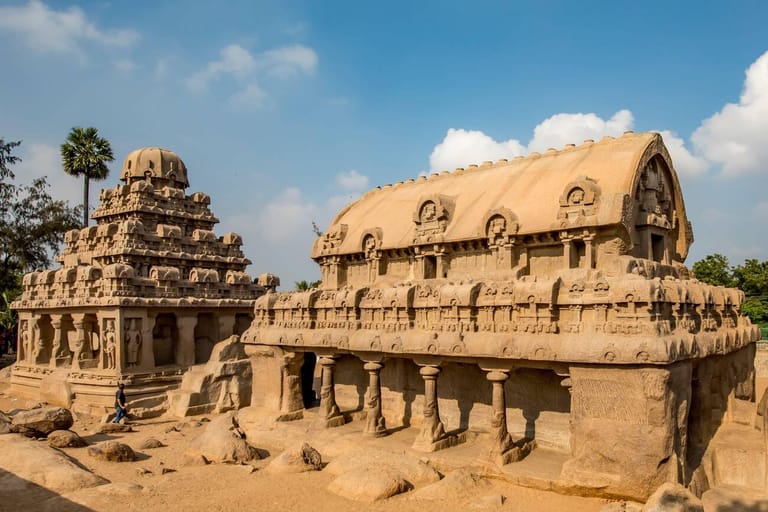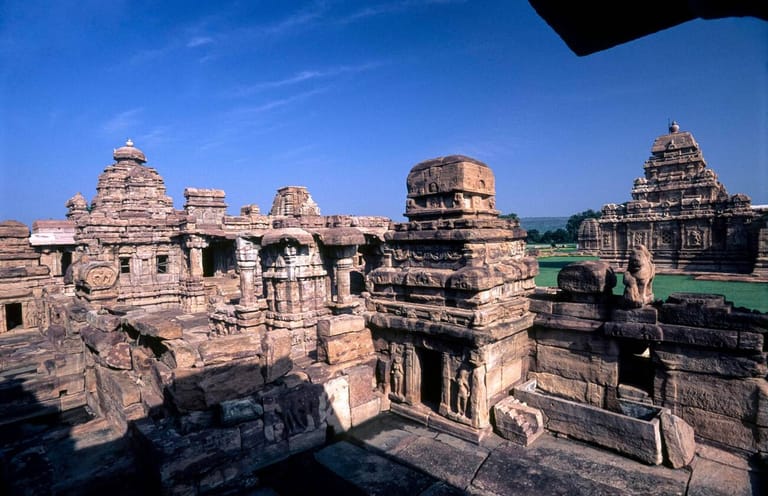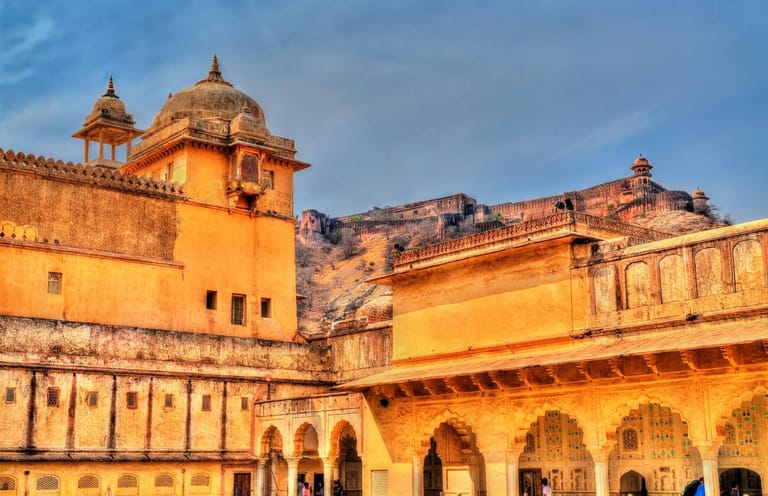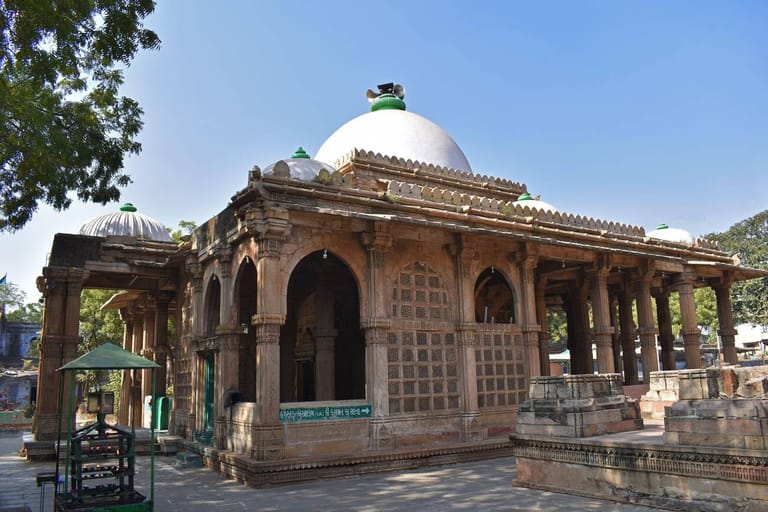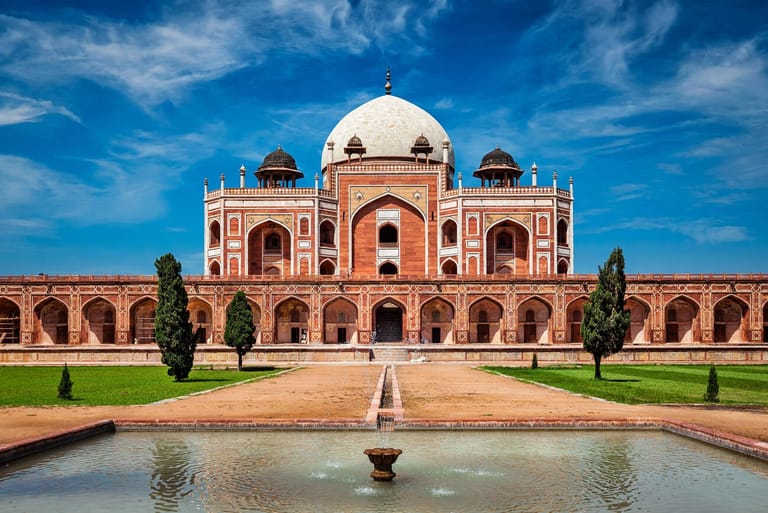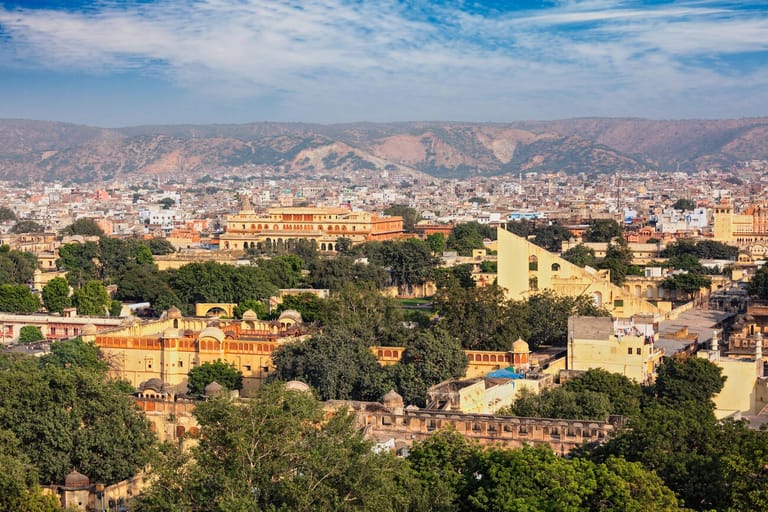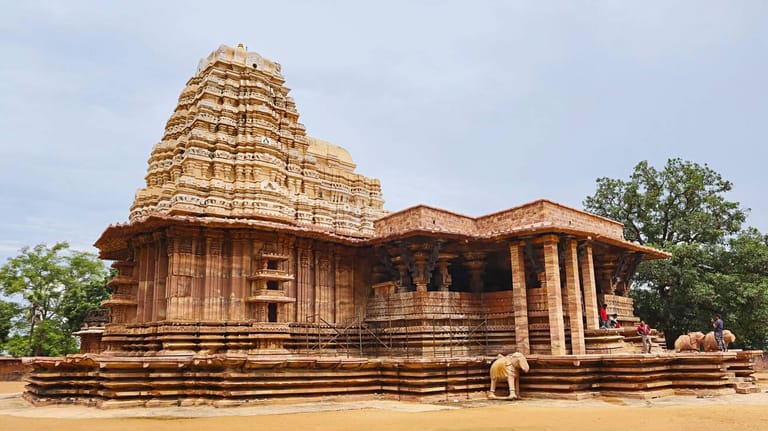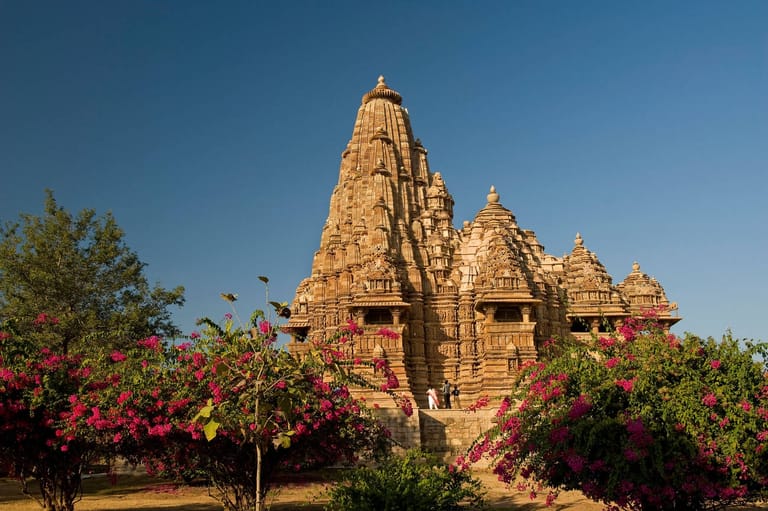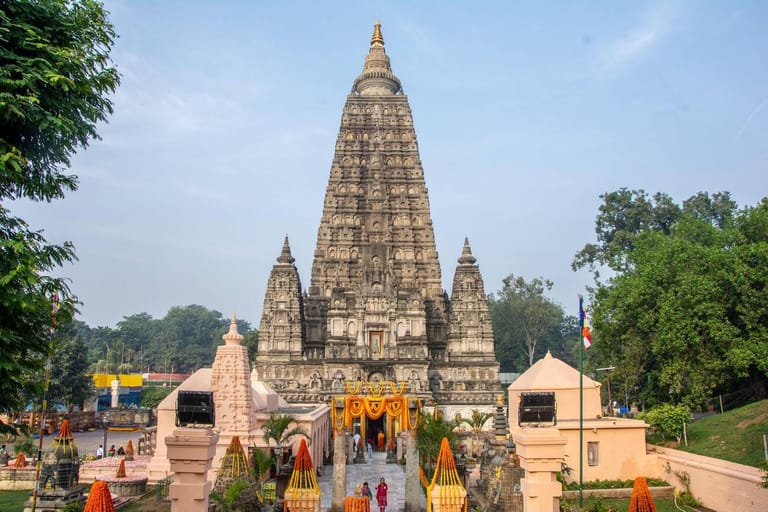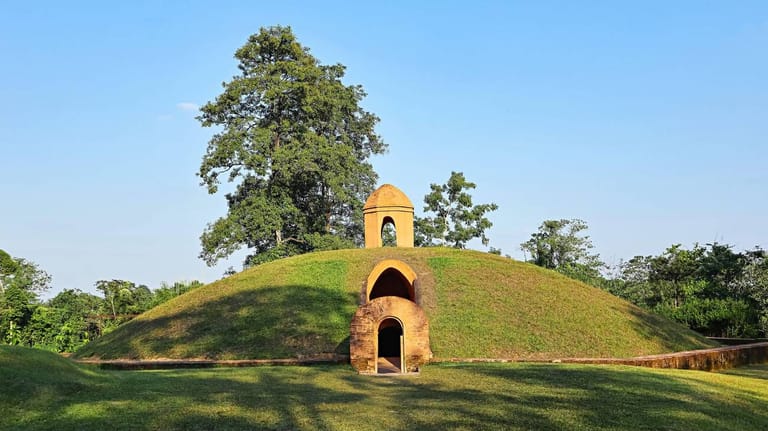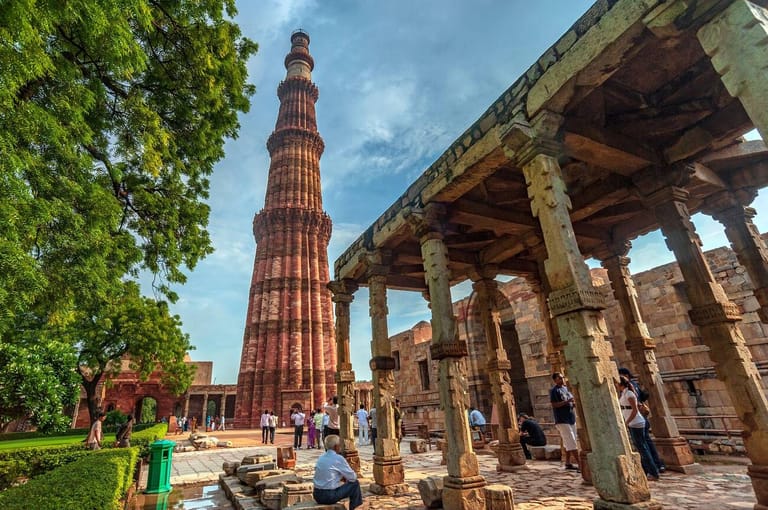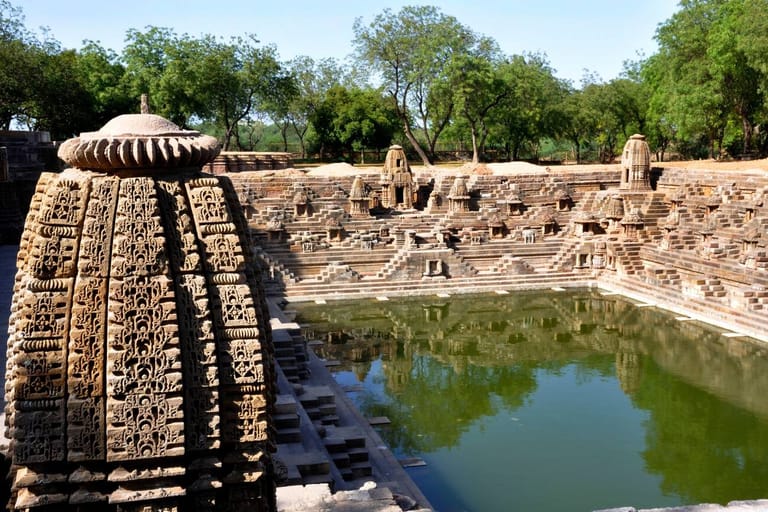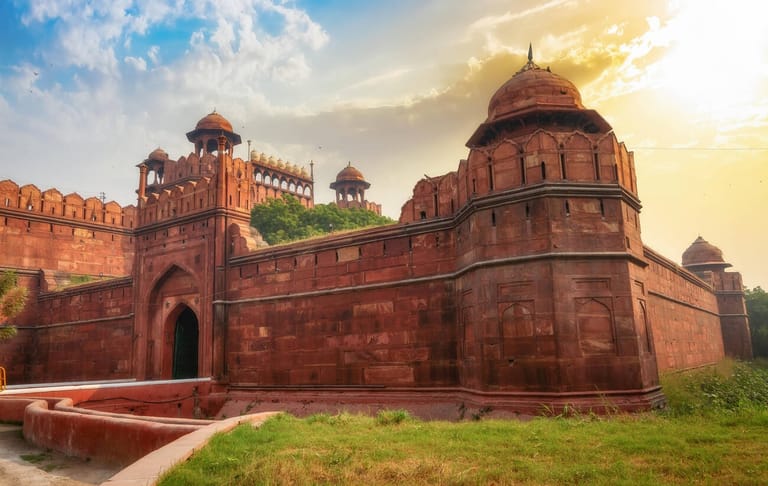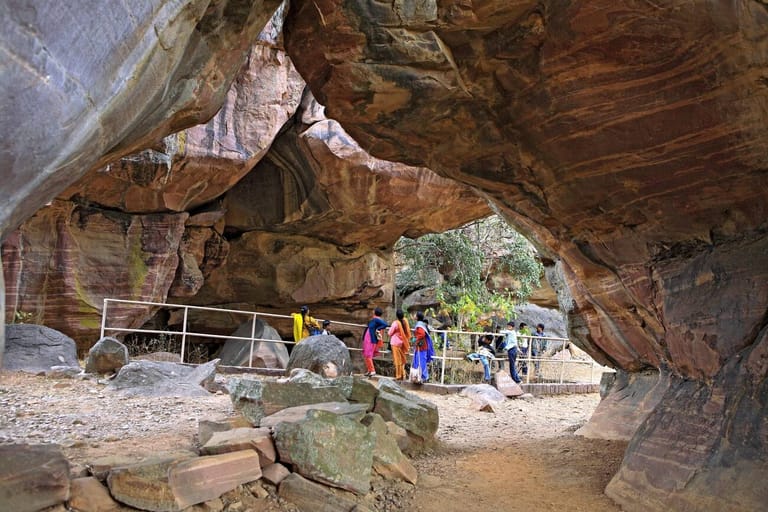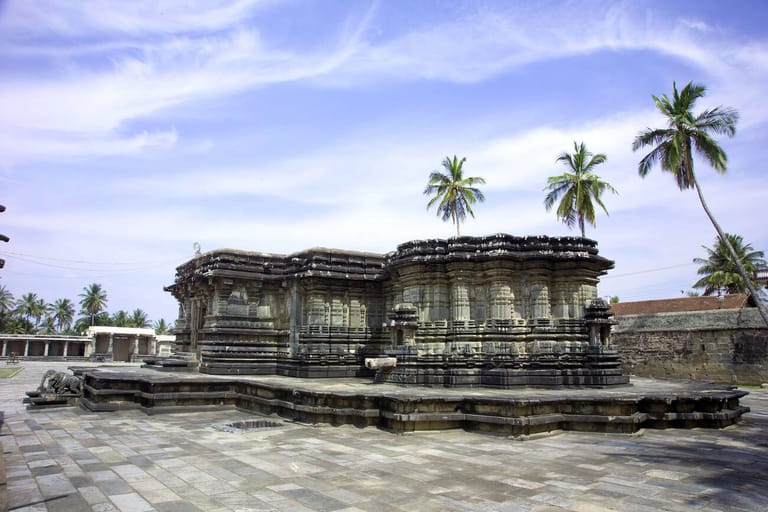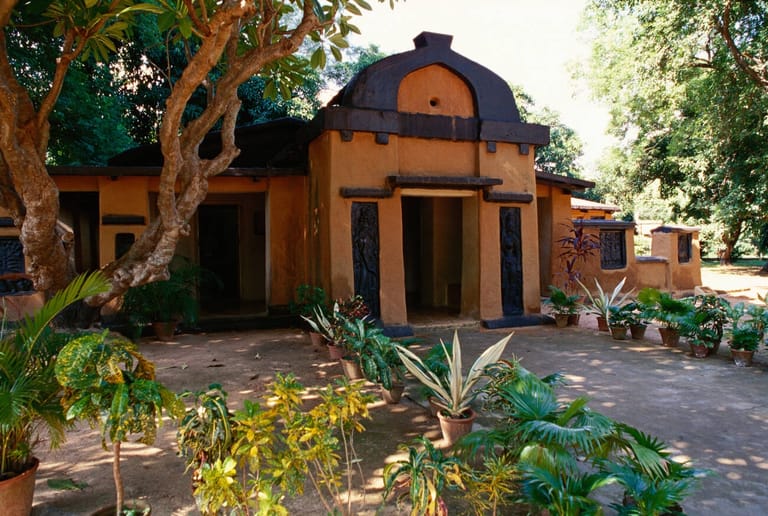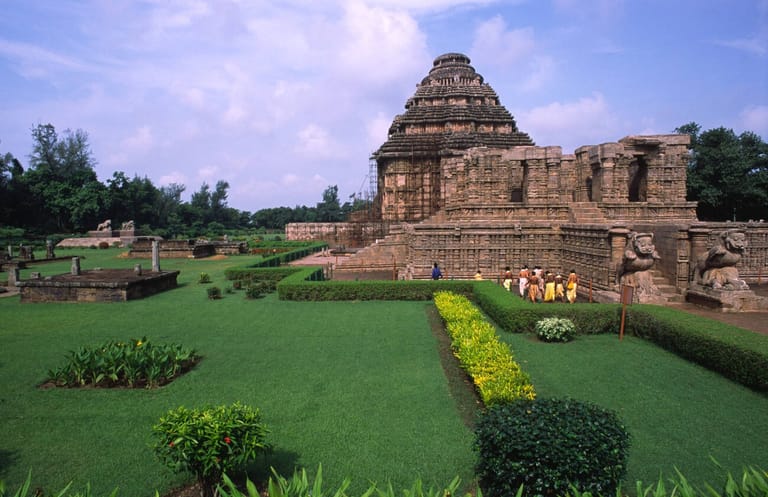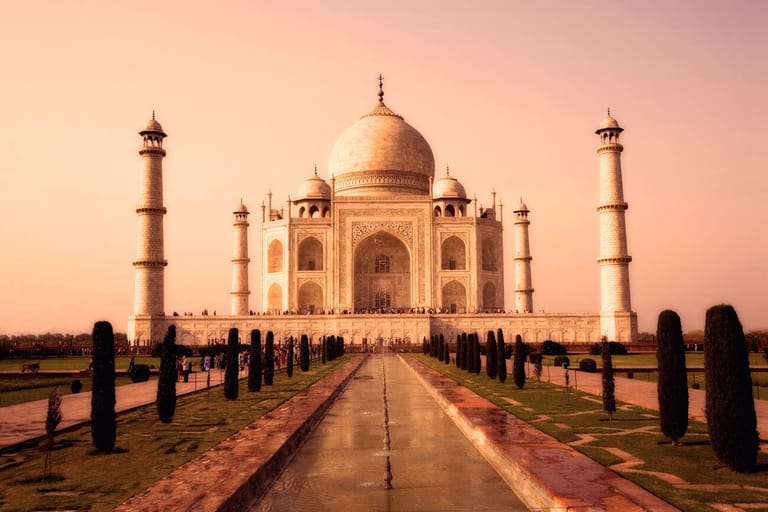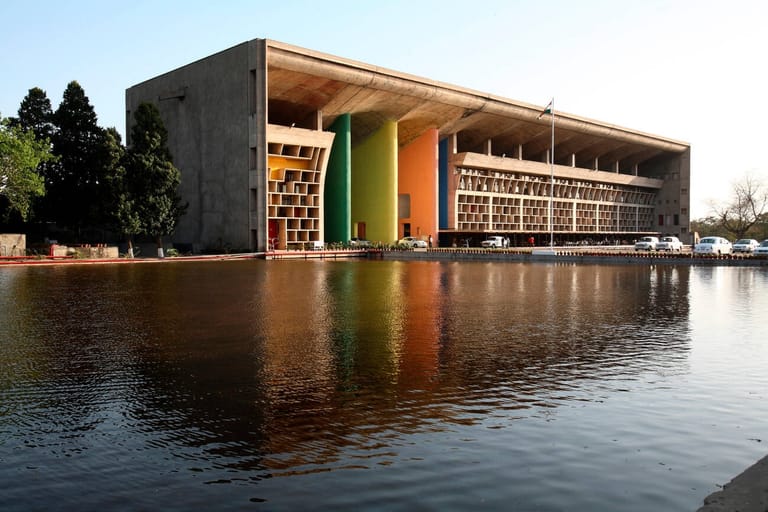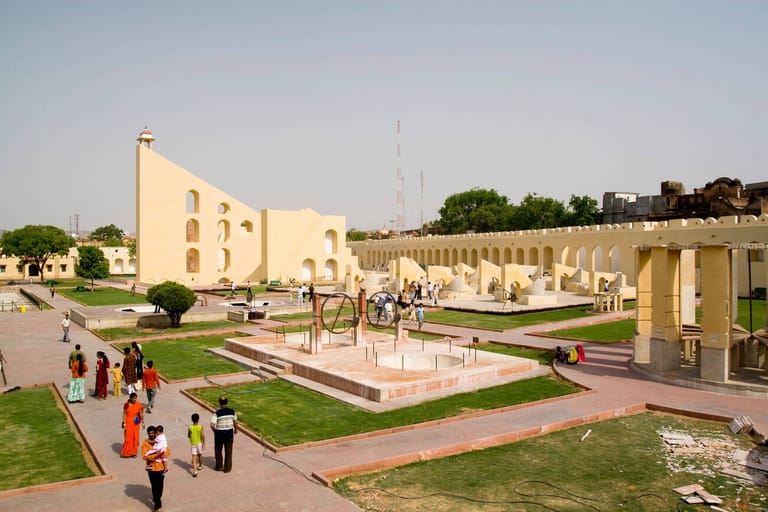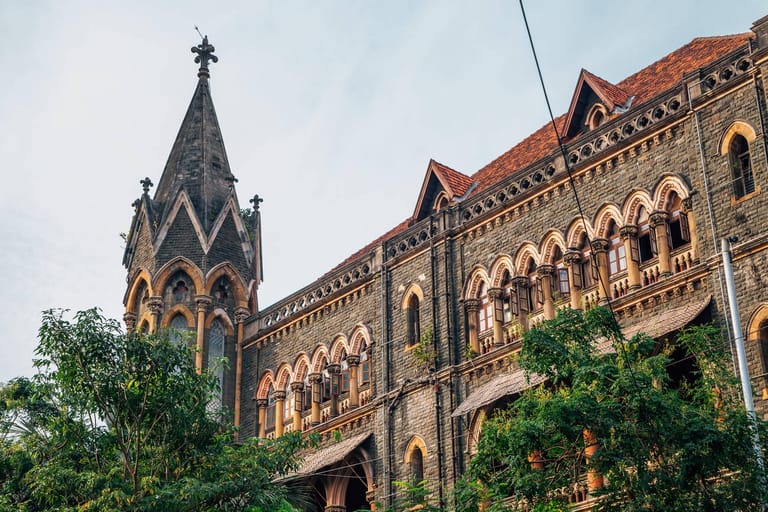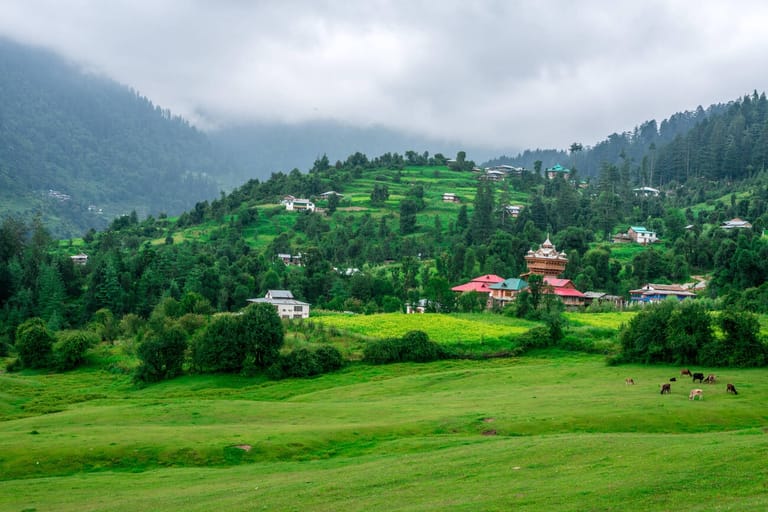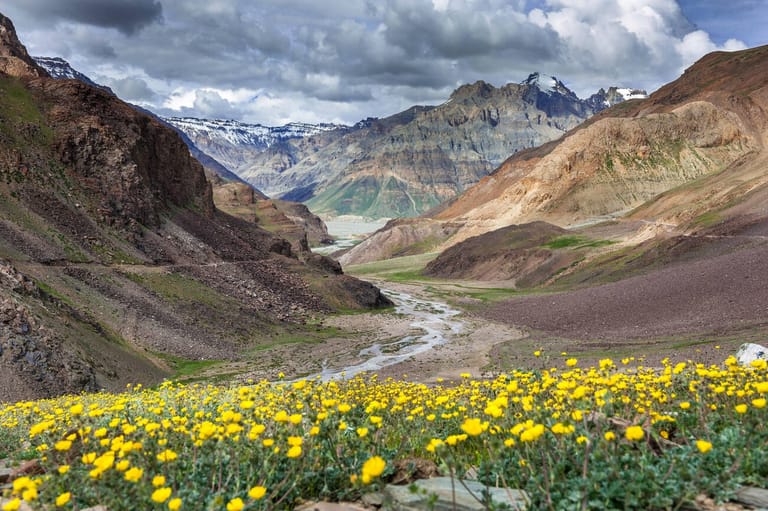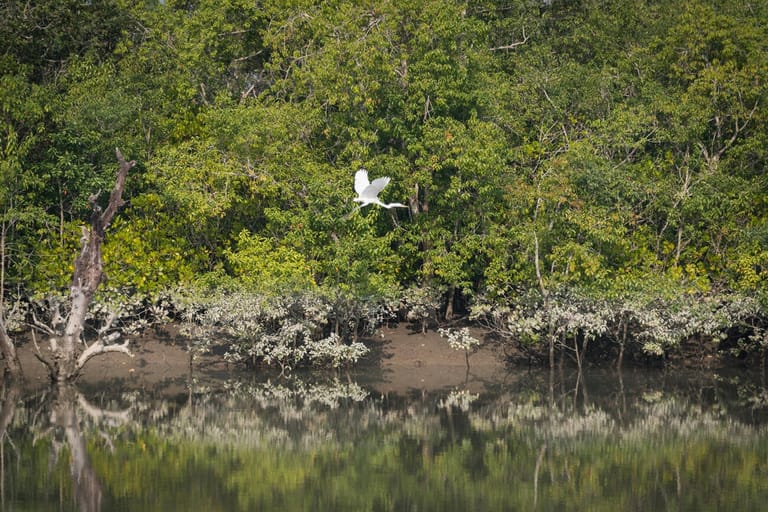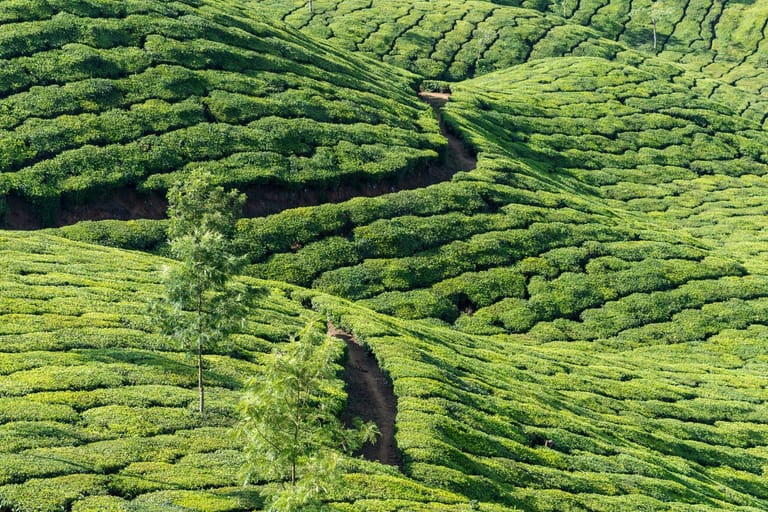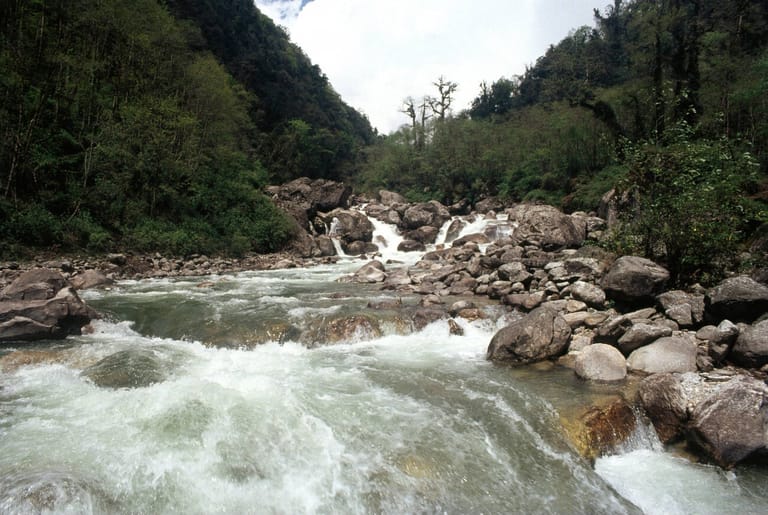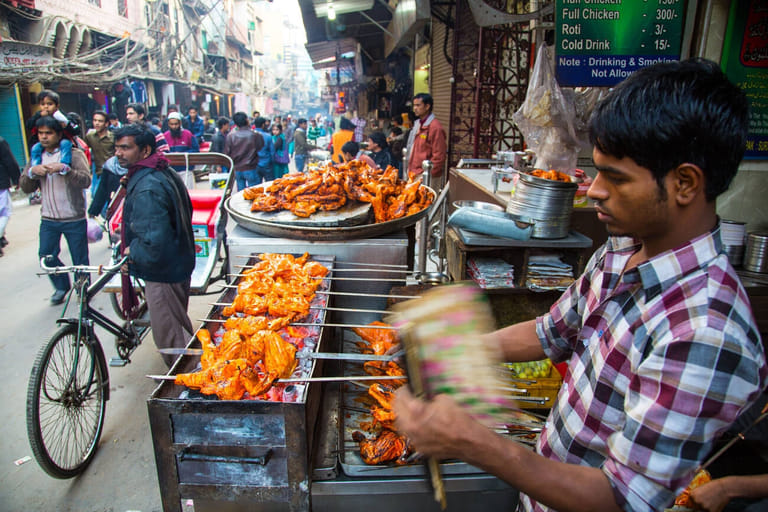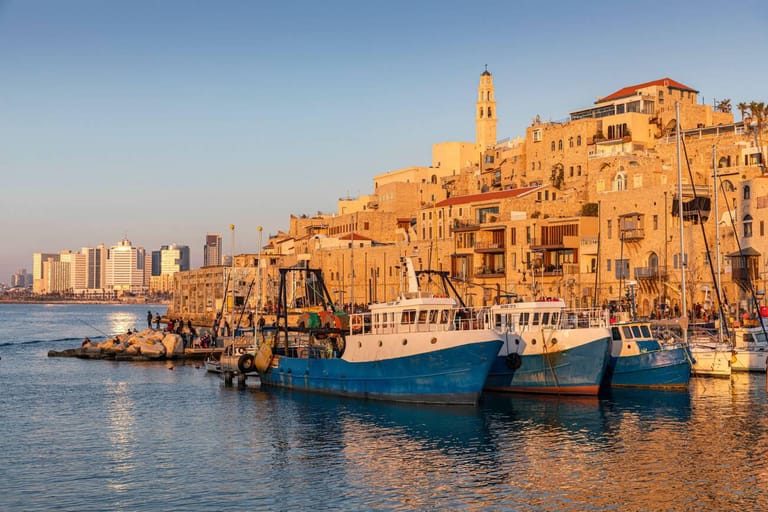If India had a brag board, its 44 UNESCO World Heritage Sites would be the brightest stars! So, this time, don’t just stick to the usual tourist spots, make your India trip truly special by exploring the UNESCO World Heritage Sites in India that define the country’s timeless charm.
UNESCO World Heritage Sites are those landmarks so unique and valuable that the entire world agrees they deserve to be preserved forever. They represent the best of India’s culture, architecture, and nature, proof that our heritage isn’t just history, it’s still very much alive.
So, if your travel bucket list needs a glow-up, you’re in the right place! Get ready to explore the UNESCO World Heritage Sites in India that’ll make you realize exactly why they were worth protecting, because these aren’t just destinations, they’re time machines!
Built between 1565 and 1573 by Emperor Akbar, Agra Fort is a UNESCO-recognized Mughal fortress located near the Taj Mahal. Enclosed within 2.5 km of massive red sandstone walls, it houses architectural marvels like the Jahangir Palace, Diwan-i-Khas, and Sheesh Mahal.
The fort served as the main residence of the Mughal emperors until 1638 and witnessed key historical events, including the imprisonment of Shah Jahan. Recognized among the grandest Heritage places in India, Agra Fort reflects the perfect fusion of defense, elegance, and power.
- UNESCO Declaration Year: 1983
Declared for: Its Mughal architecture and role as the empire’s main stronghold.
Dating back to the 2nd century BCE, the Ajanta Caves are a group of 30 rock-cut Buddhist monuments carved into a horseshoe-shaped cliff along the Waghora River. These caves feature paintings and sculptures that vividly narrate Jataka tales and the life of Buddha.
Once rediscovered in 1819 by British soldiers, they have since become a window into ancient Indian art, technique, and spirituality. Globally admired for their artistic excellence, the Ajanta Caves remain one of the most treasured India heritage sites, attracting historians and artists alike.
- UNESCO Declaration Year: 1983
- Declared for: Rock-cut Buddhist art and murals depicting Buddha’s life and Jataka tales.
3. Archaeological Site of Nalanda Mahavihara at Nalanda, Bihar
Established in the 5th century CE, Nalanda Mahavihara was one of the world’s earliest residential universities, accommodating over 10,000 students and 2,000 teachers. Supported by Gupta and Pala dynasty rulers, Nalanda specialized in Buddhist studies, medicine, logic, and philosophy.
Excavations have revealed monasteries, temples, and inscriptions that reflect advanced urban planning and educational excellence. Scholars like Xuanzang and Yijing once studied here. Today, Nalanda stands as one of the most important UNESCO sites in India, symbolizing the brilliance of India’s ancient academic legacy.
- UNESCO Declaration Year: 2016
Declared for: One of the earliest residential universities, showcasing India’s ancient education and architecture.
4. Buddhist Monuments at Sanchi, Madhya Pradesh
Commissioned by Emperor Ashoka in the 3rd century BCE, the Buddhist Monuments at Sanchi form one of India’s oldest surviving Buddhist complexes. The Great Sanchi Stupa, a hemispherical dome housing Buddha’s relics, is the centerpiece, surrounded by intricately carved gateways (toranas) depicting episodes from his life.
The site also includes monasteries, temples, and pillars dating up to the 12th century CE. A masterpiece of Mauryan architecture and Buddhist devotion, Sanchi continues to attract pilgrims and scholars, preserving a vital chapter of India’s religious and cultural history.
- UNESCO Declaration Year: 1989
- Declared for: Its well-preserved Buddhist stupas, monasteries, and temples dating back to the 3rd century BCE.
5. Champaner-Pavagadh Archaeological Park, Gujarat
Spread across 1,329 hectares, the Champaner-Pavagadh Archaeological Park is a remarkable blend of Hindu and Islamic architectural styles dating from the 8th to 14th centuries. The site includes fortifications, mosques like Jama Masjid, temples, palaces, stepwells, and residential complexes.
Once the capital of Sultan Mahmud Begada’s Gujarat Sultanate, it represents a rare example of a pre-Mughal Islamic city preserved intact. With its layers of culture and history, Champaner-Pavagadh stands as an invaluable record of medieval urban planning and remains one of Gujarat’s most captivating heritage landscapes.
- UNESCO Declaration Year: 2004
- Declared for: Its unique combination of Hindu and Islamic architecture and as an exceptional example of a pre-Mughal Islamic city.
Built in 1887, Chhatrapati Shivaji Terminus is a stunning mix of Victorian Gothic and Indian architectural styles. Designed by Frederick William Stevens, this busy railway station is more than just a place for trains, it's a symbol of Mumbai’s history and culture.
The building is full of carved domes, turrets, pointed arches, and stained-glass windows, showing off amazing craftsmanship from the colonial era. As one of the most famous UNESCO sites in India, it perfectly blends European and Indian design, reflecting the city’s rich heritage.
- UNESCO Declaration Year: 2004
- Declared for: Outstanding Victorian Gothic architecture fused with Indian traditional elements; a symbol of Mumbai’s colonial and cultural heritage.
Suggested Read: 52+ Iconic Tourist Attractions in India 2025 to Explore Now
7. Churches and Convents of Goa
Built in the 16th and 17th centuries, Goa’s churches and convents show the state’s Portuguese influence on religion, art, and architecture. Famous sites like the Basilica of Bom Jesus, Se Cathedral, and Church of St. Francis of Assisi has Baroque and Indo-Portuguese designs.
These cultural world heritage sites are important for history, religion, and art. They tell the story of Goa’s European connections while keeping centuries-old Indian-Christian traditions alive, making them a key part of India’s heritage.
- UNESCO Declaration Year: 1986
- Declared for: Exemplary Portuguese-influenced Christian architecture reflecting Goa’s historical role in cultural exchange.
Key Highlights: Basilica of Bom Jesus, Se Cathedral, Church of St. Francis of Assisi.
8. Dholavira: A Harappan City, Gujarat
Dholavira, built around 3000–1500 BCE, is one of the most advanced cities of the Harappan civilization. Located in Kutch, Gujarat, it had a citadel, middle town, lower town, ceremonial ground, and smart water systems like reservoirs and step wells.
Declared a UNESCO World Heritage Site in India, Dholavira shows how skilled ancient Indians were in city planning, engineering, and organizing society. Its ruins give a rare look into life in early India, making it an important heritage place in India.
- UNESCO Declaration Year: 2021
- Declared for: One of the most well-preserved urban settlements of the Harappan civilization, showcasing advanced city planning and water management.
9. Elephanta Caves, Maharashtra
Located on Elephanta Island near Mumbai, these caves were carved between the 5th and 8th centuries CE. They are mainly dedicated to Hindu gods. The highlight is the Trimurti of Shiva, a huge sculpture showing Shiva as creator, preserver, and destroyer.
The caves are full of rock-cut carvings and sculptures that tell stories from ancient Indian mythology. Listed as one of the UNESCO sites in India, Elephanta Caves mix religion, art, and history, offering visitors a peek into India’s spiritual past.
- UNESCO Declaration Year: 1987
- Declared for: Rock-cut caves featuring magnificent sculptures of Hindu deities, reflecting ancient Indian art and spirituality.
10. Ellora Caves, Maharashtra
Built between 600–1000 CE, the Ellora Caves are a group of 34 rock-cut temples and monasteries representing Buddhist, Hindu, and Jain traditions. The most famous is the Kailasa Temple, carved out of a single rock and one of the largest of its kind in the world.
The caves feature amazing sculptures, murals, and carvings showing India’s religious diversity and artistic skills. As one of the most popular heritage places in India, Ellora is a must-visit for travelers, pilgrims, and history lovers, showing India’s creativity and spiritual richness.
- UNESCO Declaration Year: 1983
- Declared for: Unique rock-cut architecture combining Buddhist, Hindu, and Jain religious traditions.
11. Fatehpur Sikri, Uttar Pradesh
Built in the late 16th century by Emperor Akbar, Fatehpur Sikri was the capital of the Mughal Empire for a short time. Made entirely of red sandstone, the city is home to iconic structures like Buland Darwaza, Jama Masjid, Panch Mahal, and royal palaces.
Its architecture showcases the brilliance of Mughal urban planning and design. Recognized as one of the most important heritage places in India, Fatehpur Sikri reflects a perfect blend of history, culture, and artistic skill, making it a must-visit for travelers interested in India’s rich past.
- UNESCO Declaration Year: 1986
Declared for: Its stunning Mughal architecture and historical importance as the capital built by Emperor Akbar.
12. Great Living Chola Temples, Tamil Nadu
Built between the 9th and 13th centuries, the Great Living Chola Temples highlight the architectural genius of the Chola dynasty. The Brihadeeswarar Temple in Thanjavur is the most famous, with its massive vimana (tower) and detailed sculptures.
These temples show the religious devotion, artistic skill, and urban planning of ancient South India. Declared an Indian heritage site, they are a stunning example of Dravidian temple architecture and a testament to India’s cultural and spiritual history.
- UNESCO Declaration Year: 1987
- Declared for: Their outstanding Dravidian architecture and significance in South Indian temple culture.
13. Group of Monuments at Hampi, Karnataka
Hampi was the capital of the Vijayanagara Empire during the 14th–16th centuries and is now a sprawling site of ruins set among rocky hills. It features temples, royal complexes, bazaars, and stone chariots, reflecting the grandeur of medieval Indian urban design and architecture.
As a UNESCO world heritage site India, Hampi is famous for its combination of history, architecture, and natural beauty, attracting historians, travelers, and photographers alike.
- UNESCO Declaration Year: 1986
- Declared for: Its large-scale ruins and architectural brilliance from the Vijayanagara Empire.
14. Group of Monuments at Mahabalipuram, Tamil Nadu
Constructed in the 7th–8th centuries by the Pallava kings, Mahabalipuram is known for its rock-cut temples, mandapas, shore temples, and intricate bas-reliefs. The carvings depict Hindu legends, especially of Shiva and Vishnu, and are a fine example of early Dravidian art.
Listed among India’s most significant heritage places in India, Mahabalipuram shows the creativity and religious devotion of South Indian rulers and is a must-visit for history and art lovers.
- UNESCO Declaration Year: 1984
Declared for: Its unique rock-cut architecture and early South Indian art forms.
15. Group of Monuments at Pattadakal, Karnataka
Pattadakal, built during the 7th–8th centuries by the Chalukya dynasty, was a ceremonial site for coronations. The complex includes temples, shrines, and carved pillars that blend northern Nagara and southern Dravidian architectural styles.
Recognized as a key India heritage site, Pattadakal represents the pinnacle of early medieval temple architecture in India, offering visitors insight into the artistic, religious, and cultural achievements of the period.
- UNESCO Declaration Year: 1987
Declared for: Its mix of Dravidian and Nagara architectural styles from the Chalukya dynasty.
16. Hill Forts of Rajasthan
The Hill Forts of Rajasthan include six majestic forts, Chittorgarh, Kumbhalgarh, Ranthambore, Amber, Jaisalmer, and Gagron, spread across the Aravalli Range. Built between the 5th and 18th centuries, these forts reflect Rajput valor, architectural brilliance, and the strategic genius of medieval India.
Each fort has massive walls, intricate palaces, temples, and water reservoirs that show the grandeur of Rajput rule. Recognized as one of the finest India heritage sites, these forts symbolize courage, culture, and centuries of royal legacy.
- UNESCO Declaration Year: 2013
Declared for: Showcasing Rajput military architecture, cultural traditions, and historic significance.
17. Historic City of Ahmedabad, Gujarat
Founded by Sultan Ahmad Shah in 1411, Ahmedabad is India’s first UNESCO-recognized historic city. The old walled city is known for its unique blend of Hindu, Islamic, and Jain architecture, traditional houses (pols), and vibrant community life.
It stands as a living example of cultural coexistence and urban heritage. As one of the most remarkable cultural world heritage sites, Ahmedabad beautifully preserves India’s medieval charm while coexisting with modern urban life.
- UNESCO Declaration Year: 2017
- Declared for: Its outstanding urban planning, cultural harmony, and architectural heritage.
18. Humayun’s Tomb, Delhi
Built in 1570 by Empress Bega Begum, Humayun’s Tomb was the first garden-tomb in India and a major influence on later Mughal monuments, including the Taj Mahal.
Designed by Persian architect Mirak Mirza Ghiyas, it combines Persian and Indian styles with red sandstone, white marble, and symmetrical gardens. Recognized as a UNESCO world heritage site India, it represents the dawn of Mughal architecture in India and remains one of Delhi’s most visited historic spots.
- UNESCO Declaration Year: 1993
- Declared for: Introducing Persian-style garden tomb architecture in India and inspiring later Mughal masterpieces.
Suggested Read: 12 Must-See Historical Places In India To Visit in 2025
19. Jaipur City, Rajasthan
Established in 1727 by Maharaja Sawai Jai Singh II, Jaipur is known as the “Pink City” for its uniformly colored buildings. It was one of the first planned cities of India, with a grid system influenced by ancient Vedic architecture.
Jaipur blends traditional Rajput, Mughal, and Western urban planning styles, making it a perfect example of architectural innovation and cultural richness. Today, it stands proudly among India heritage sites for preserving its historical essence in a modern world.
- UNESCO Declaration Year: 2019
- Declared for: Its urban planning, architectural harmony, and representation of Rajput culture.
20. Kakatiya Rudreshwara (Ramappa) Temple, Telangana
Built in the 13th century by the Kakatiya rulers, the Ramappa Temple near Warangal is dedicated to Lord Shiva. It is famous for its intricate carvings, floating bricks used in construction, and its unique star-shaped platform.
The temple showcases exceptional craftsmanship in sandstone and stands as a tribute to the artistic excellence of the Kakatiya dynasty. It’s one of the most recent cultural world heritage sites recognized by UNESCO for its engineering marvel and design.
- UNESCO Declaration Year: 2021
- Declared for: Outstanding craftsmanship, unique construction techniques, and representation of Kakatiya art and culture.
21. Khajuraho Group of Monuments, Madhya Pradesh
The Khajuraho Temples, built between 950 and 1050 CE by the Chandela dynasty, are known for their beautifully carved sculptures that depict art, devotion, and life in harmony. Out of the original 85 temples, about 25 remain today, showcasing an incredible mix of Hindu and Jain architecture. Recognized among the most stunning World Heritage Sites in India, Khajuraho stands as a testament to India’s creativity and spiritual depth.
- UNESCO Declaration Year: 1986
- Declared for: Exceptional temple architecture and intricate sculptures depicting art, culture, and spirituality of medieval India.
22. Mahabodhi Temple Complex at Bodh Gaya, Bihar
The Mahabodhi Temple marks the sacred spot where Lord Buddha attained enlightenment under the Bodhi Tree. Originally built in the 3rd century BCE and later renovated, it’s one of the oldest brick temples in India. Pilgrims from all over the world visit this peaceful site, a true gem among India heritage sites, symbolizing compassion and spiritual awakening.
- UNESCO Declaration Year: 2002
Declared for: Outstanding universal value as the site of Buddha’s enlightenment and a major center of Buddhist pilgrimage.
23. Maratha Military Landscapes of India
Added recently to the World Heritage Sites in India, the Maratha Military Landscapes include forts like Raigad, Shivneri, and Rajgad — marvels of engineering and strategy from the 17th–19th centuries. These sites highlight the Maratha Empire’s mastery in using rugged terrains for defense, combining natural barriers with architectural strength.
- UNESCO Declaration Year: 2024
- Declared for: Unique military architecture and landscape planning showcasing the Maratha Empire’s strategic genius and cultural identity.
Suggested Read: 13 Best Places To Visit In December In India
24. Moidams – The Mound-Burial System of the Ahom Dynasty, Assam
The Moidams, also called the “Pyramids of Assam,” are royal burial mounds of the Ahom rulers, dating from the 13th–19th centuries. These mounds contain burial chambers, treasures, and artifacts that reveal the Ahoms’ advanced funerary practices and architectural skill.
- UNESCO Declaration Year: 2024
Declared for: Representation of the unique funerary traditions and architectural heritage of the Ahom dynasty.
25. Mountain Railways of India (Darjeeling, Nilgiri & Kalka–Shimla)
The Mountain Railways of India showcase the blend of engineering brilliance and scenic beauty. Built during British rule, these railways traverse steep mountains and sharp curves, offering panoramic views and a nostalgic experience of early rail travel.
- UNESCO Declaration Year: 1999 (Darjeeling), 2005 (Nilgiri), 2008 (Kalka–Shimla)
Declared for: Remarkable engineering achievement in connecting difficult mountain terrains, reflecting the innovation of colonial-era railways.
26. Qutub Minar and its Monuments, Delhi
Built in 1193 by Qutb-ud-din Aibak and later expanded by Iltutmish, the Qutub Minar is one of the tallest brick minarets in the world at 73 meters. Surrounded by ancient structures like the Quwwat-ul-Islam Mosque and the Iron Pillar, it reflects the beginning of Indo-Islamic architecture in India. A proud symbol among the World Heritage Sites in India, the complex showcases the architectural transition from Hindu to Islamic styles during the Delhi Sultanate.
- UNESCO Declaration Year: 1993
- Declared for: Exceptional example of early Indo-Islamic architecture and its historical significance in medieval India.
27. Rani-ki-Vav (Queen’s Stepwell), Gujarat
Constructed in the 11th century by Queen Udayamati in memory of King Bhimdev I, Rani-ki-Vav is an architectural masterpiece built upside-down, leading to the water level. It’s adorned with over 500 sculptures depicting deities and mythological themes. Restored from ruins, this stepwell stands as one of the most beautifully preserved India heritage sites, combining functionality and artistic brilliance.
- UNESCO Declaration Year: 2014
Declared for: Outstanding craftsmanship and symbolism representing India’s ancient water management and artistic heritage.
28. Red Fort Complex, Delhi
Commissioned by Emperor Shah Jahan in 1638, the Red Fort served as the main residence of Mughal emperors for nearly 200 years. Built from striking red sandstone, it’s a fine example of Mughal planning and Persian-influenced architecture. Now a major attraction among the UNESCO World Heritage Site India list, it also holds immense national importance as the place where India’s Independence Day celebrations begin each year.
- UNESCO Declaration Year: 2007
Declared for: Architectural and cultural significance as a symbol of India’s Mughal heritage and political history.
29. Rock Shelters of Bhimbetka, Madhya Pradesh
These prehistoric rock shelters, located within the Vindhya Hills, date back over 30,000 years and feature some of the world’s oldest cave paintings. Depicting hunting scenes, dances, and everyday life, they provide a fascinating glimpse into early human civilization. As one of the most unique World Heritage Sites in India, Bhimbetka connects archaeology, art, and anthropology in one place.
- UNESCO Declaration Year: 2003
Declared for: Earliest evidence of human life and rock art traditions that trace the evolution of human culture.
30. Sacred Ensembles of the Hoysalas, Karnataka
Added in 2023, these temples, especially those at Belur, Halebidu, and Somnathapura, represent the height of Hoysala art and craftsmanship (12th–13th century). Renowned for their intricate carvings, star-shaped platforms, and storytelling sculptures, they beautifully reflect South India’s temple architecture and devotion.
- UNESCO Declaration Year: 2023
- Declared for: Exceptional craftsmanship and architectural innovation representing the cultural and spiritual legacy of the Hoysala dynasty.
Suggested Read: 25 Top Honeymoon Destinations in India 2025
31. Santiniketan, West Bengal
Founded by Nobel Laureate Rabindranath Tagore in 1901, Santiniketan was envisioned as a center for learning that blended education, art, and nature. It became the foundation for Visva-Bharati University and a hub for cultural exchange and creativity.
The town’s open-air classrooms, artistic architecture, and philosophical roots earned it recognition among the most inspiring cultural world heritage sites, reflecting India’s contribution to modern education and global humanism.
- UNESCO Declaration Year: 2023
Declared for: Outstanding representation of Tagore’s vision of holistic education, art, and culture.
32. Sun Temple, Konark, Odisha
Built in the 13th century by King Narasimhadeva I, the Sun Temple at Konark is shaped like a colossal chariot dedicated to the Sun God, Surya, with twelve intricately carved wheels and seven stone horses. Its sculptures and carvings display remarkable precision and artistry. Recognized as one of the greatest Heritage places in India, this temple stands as a symbol of architectural brilliance and devotion.
- UNESCO Declaration Year: 1984
Declared for: Exceptional representation of Kalinga architecture and its artistic depiction of life, time, and divinity.
33. Taj Mahal, Agra, Uttar Pradesh
Commissioned by Mughal Emperor Shah Jahan in 1632 in memory of his beloved wife Mumtaz Mahal, the Taj Mahal is often called the “epitome of love.” This white marble masterpiece combines Persian, Islamic, and Indian architectural styles, making it one of the most admired structures in the world. Listed among the finest cultural world heritage sites, it attracts millions of visitors every year for its beauty and emotional depth.
- UNESCO Declaration Year: 1983
Declared for: Architectural perfection and universal admiration as a symbol of love and human creativity.
34. The Architectural Work of Le Corbusier, Chandigarh
Designed by Swiss-French architect Le Corbusier in the 1950s, Chandigarh is one of the best examples of modernist urban planning in India. With its clean layout, geometric buildings, and innovative use of space, it stands as a bold vision of post-independence architecture. The city’s Capitol Complex represents a turning point in modern design and planning.
- UNESCO Declaration Year: 2016
- Declared for: Outstanding contribution to modern architecture and urban planning principles of the 20th century.
35. The Jantar Mantar, Jaipur
Built in 1734 by Maharaja Sawai Jai Singh II, Jantar Mantar is an astronomical observatory featuring 19 large instruments used to measure time, predict eclipses, and track celestial movements. Its massive sundial, the Samrat Yantra, remains one of the largest in the world. A fascinating blend of science and spirituality, it reflects India’s advanced astronomical knowledge.
- UNESCO Declaration Year: 2010
Declared for: Exceptional scientific and architectural design showcasing the astronomical skills of 18th-century India.
36. Victorian Gothic and Art Deco Ensembles of Mumbai
This unique urban landscape showcases Mumbai’s transformation from a colonial port city to a modern metropolis. The ensemble includes grand Victorian Gothic buildings like the Bombay High Court and Art Deco masterpieces along Marine Drive.
Together, they represent two distinct architectural eras harmoniously coexisting. As one of the remarkable world heritage sites in India, it celebrates the city’s creative spirit and architectural evolution from the 19th to 20th century.
- UNESCO Declaration Year: 2018
Declared for: Exceptional blend of Victorian Gothic and Art Deco architecture reflecting Mumbai’s global cultural development.
37. Great Himalayan National Park Conservation Area, Himachal Pradesh
Located in the Kullu region, this park spans alpine meadows, glaciers, and forests that host over 375 species of fauna, including the snow leopard and Himalayan brown bear. It’s a paradise for trekkers and nature lovers. Recognized among the top world heritage sites in India, it represents the country’s stunning biodiversity and commitment to preserving fragile mountain ecosystems.
- UNESCO Declaration Year: 2014
- Declared for: Outstanding natural beauty and exceptional biodiversity in the Western Himalayas.
Suggested Read: 12 Amazing Things to Do in India: Top Experiences for 2025!
38. Kaziranga National Park, Assam
Kaziranga National Park is home to two-thirds of the world’s one-horned rhinoceroses, along with tigers, elephants, and migratory birds. Spread over lush floodplains, it’s a symbol of successful wildlife conservation in India. The park’s dynamic ecosystem supports rare flora and fauna, making it a must-visit for wildlife enthusiasts.
- UNESCO Declaration Year: 1985
- Declared for: Unique ecosystem supporting endangered species and outstanding natural habitats of global significance.
39. Keoladeo National Park, Rajasthan
Originally a royal hunting reserve, Keoladeo National Park (Bharatpur Bird Sanctuary) is now one of the world’s premier bird-watching destinations. It shelters over 370 species of birds, including the rare Siberian crane. The park’s wetlands also provide critical breeding and feeding grounds for migratory birds.
- UNESCO Declaration Year: 1985
- Declared for: Exceptional wetland ecosystem and vital habitat for migratory and resident bird species.
40. Manas Wildlife Sanctuary, Assam
Nestled at the foothills of the Himalayas, Manas is a breathtaking reserve known for its rare wildlife, including tigers, pygmy hogs, and golden langurs. The park’s scenic landscapes, from grasslands to forests, make it both a natural wonder and a conservation success.
- UNESCO Declaration Year: 1985
Declared for: Rich biodiversity and representation of natural beauty in India’s Himalayan foothills.
41. Nanda Devi and Valley of Flowers National Parks, Uttarakhand
Located high in the Himalayas, these two adjoining parks are known for their stunning natural beauty and rich biodiversity. The Valley of Flowers turns into a colorful paradise during the monsoon, while Nanda Devi, centered around India’s second-highest peak, is known for its rugged landscapes and rare wildlife. Together, they form one of the most breathtaking world heritage sites in India, showcasing nature’s pure and untouched charm.
- UNESCO Declaration Year: 1988
Declared for: Exceptional natural beauty, diverse alpine flora, and unique Himalayan ecosystems.
42. Sundarbans National Park, West Bengal
The Sundarbans is the world’s largest mangrove forest and a UNESCO treasure located at the mouth of the Ganga, Brahmaputra, and Meghna rivers. It is home to the famous Royal Bengal Tiger, saltwater crocodiles, and countless species of birds and fish. The park’s complex ecosystem protects coastal areas from storms and supports local livelihoods.
- UNESCO Declaration Year: 1987
- Declared for: Unique mangrove ecosystem, exceptional biodiversity, and critical tiger habitat.
Suggested Read: 10 Best Summer Hiking Trails in India
43. Western Ghats (across multiple states)
Stretching from Gujarat to Kerala, the Western Ghats are among the most biologically diverse regions in the world. Older than the Himalayas, this mountain range is home to lush rainforests, waterfalls, and thousands of plant and animal species found nowhere else. Recognized as one of the top natural world heritage sites in India, it plays a crucial role in maintaining the country’s monsoon climate and ecological balance.
- UNESCO Declaration Year: 2012
- Declared for: High biodiversity, endemic species, and outstanding tropical ecosystem conservation.
44. Khangchendzonga National Park, Sikkim
Nestled in the Eastern Himalayas, this park is dominated by Mount Khangchendzonga, the third-highest peak in the world. It beautifully combines natural grandeur with cultural and spiritual traditions of the local communities. The park is home to glaciers, forests, and sacred landscapes, making it both a natural and cultural wonder.
- UNESCO Declaration Year: 2016
Declared for: Exceptional natural and cultural significance, showcasing the harmony between nature and spirituality in the Himalayas.




